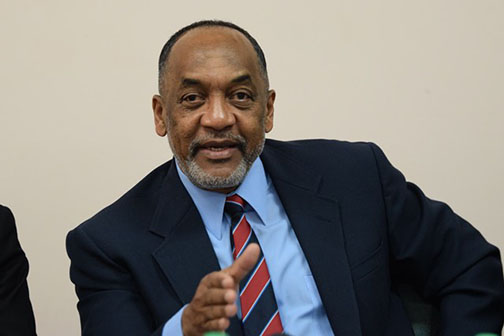Hazardous and non-hazardous waste produced by Guyana’s fast developing oil and gas sector are being managed according to international standards and best practices, according to Executive Director of the Environmental Protection Agency (EPA) Dr Vincent Adams.
However, since the EPA lacks the equipment and expertise needed to carry out the testing necessary to verify compliance in some cases, it relies heavily on mandatory reporting by operators in the oil and gas sector to verify their compliance with waste management stipulations, Adams said.
He added that while the EPA is aggressively looking to build its capacity by procuring the expertise and equipment, verification through reporting and observations is normal. In this light, he pointed to his time working in the United States’ Department of Energy. For these and other reasons, Adams said, he has no reason to believe that operators are not complying with the terms of their permits.
Guyana has passed comprehensive legislation governing the management of solid waste, but there is no specific legislation governing the management of hazardous and non-hazardous waste generated by the exploration, and drilling for oil.
Speaking with Stabroek News at the EPA’s new Ganges Street building last week, Adams shared that while it is ideal to have statute or subsidiary legislation governing the management of hazardous and non-hazardous waste generated by drilling, it is incorrect to say that such waste is completely unregulated.
According to Adams, the International Convention for the Prevention of Pollution from Ships (MARPOL) 1973, and the 1978 Protocol to the Convention, which absorbed the Convention, contains extensive provisions which seeks to regulate the management of hazardous and non-hazardous waste produced by oil ships so that the environment is protected from pollution.
According to the International Mari-time Organisation’s website, MARPOL, promulgated in response to a spate of tanker accidents in 1976-1977, is the main international convention covering the prevention of pollution of the marine environment by ships from operational or accidental cases.
The combined instrument entered into force on 2 October 1983, and in 1997, a Protocol was adopted to amend the Convention, and a new Annex (VI) was added, which entered into force in 2005. Additionally, MARPOL has been updated by amendments through the years. According to a Feasibility Study on the Development of a Regional Receptions Facilities Plan for the Small Island Deve-lopment States of the Wider Caribbean Region, produced by the Regional Acti-vity Centre/Regional Marine Pollution Emergency, Information and Training Centre (RAC-RAMPEITC Caribe), Guyana has ratified the 1972 Convention, but not the subsequent Convention which replaced it.
Importantly, although government may ratify international legal instruments, the provisions of these treaties or conventions do not become local law, binding ships subjected to Guyana’s jurisdiction, until they are made the subject of local statutes or subsidiary legislation. Against this backdrop, it is important to note that RAC-REMPEITC Caribe pointed out that Guyana “has not passed legislation to give it effect of national law.”
Annex I to the Convention contains regulations for the prevention of pollution by oil, while Annex II contains regulations for the control of pollution by noxious liquids substances in bulk. Additionally, Annex IV contains provisions aimed at preventing pollution by sewage from ships, Annex V seeks to prevent Pollution by Garbage from ships, and Annex VI seeks to prevent Air Pollution from Ships.
The extent of Guyana’s ratification of the convention and the various Annexes is uncertain, but regardless of this status, what remains true is that no legislation has been passed locally to give effect to any aspect of the Convention.
This does not stop the Convention’s provisions, however, Adams said, and he indicated that terms or conditions of operations related to waste management are included in the permits which the EPA grants to companies operating the ships drilling for oil in Guyana’s waters.
He shared that non-hazardous waste, for example, are treated aboard the vessels, and once they meet the MARPOL standards, they can be disposed of into the ocean.
On the subject of hazardous waste, Adams said this category of waste is brought ashore, treated, and stored by Tiger Tanks Trinidad Unlimited Guyana branch, whose office is located at 104 Eping Avenue, Bel Air Park, Georgetown.
The EPA, Adams said, makes routine visits to Tiger Tanks local sites, and the oil ships, to verify that the standards set are being complied with. He indicated that these activities, along with reports each operator is required to submit, are used to verify compliance with the terms of permits.
He did share, however, that the EPA lacks both the equipment and the expertise to carry out the testing which is part of the verification process. He said that attaining these resources is a priority for the agency.
Adams observed that these objectives are part of a wider effort by the EPA to establish an oil and gas unit, dedicated specifically towards regulating the environmental aspects of the burgeoning oil and gas sector.
This unit is to comprise around 36 persons, highly skilled in petroleum, geological and environmental engineering, as well as persons with relevant legal knowledge. This unit, he said, will be accommodated in the EPA’s new building.



